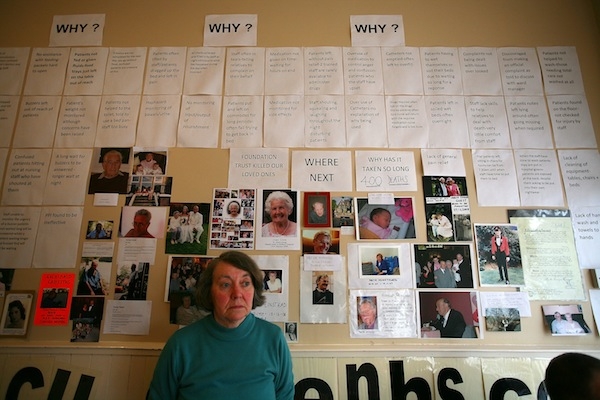One of the lessons from last week’s Eastleigh by-election – and indeed the Italian elections – is that voters don’t like politicians at the moment. It’s easy for those like Nigel Farage to mop up this anti-politics sentiment in the same way as Nick Clegg could say before the 2010 election ‘the more they attack each other, the more they sound the same’. But how does the Conservative party try to appeal to those voters fed up with the Establishment of which it is so clearly a part? David Cameron can hardly start attacking himself, after all.
There is one thing that the Tories could do – and which their backbenchers are pushing for – which would at least undermine a sense that the party is tied up in the cosy Establishment. Unfortunately, it’s something the leadership is notably reluctant to do. The government could address accountability in the public sector, rather than letting those involved in poor quality services continue to rise through the ranks. That’s a long-winded way of saying that David Nicholson, NHS chief executive, should be held accountable for his involvement in the Mid-Staffs scandal.
Conservative MP Charlotte Leslie wrote about the Early Day Motion that she’s tabled which calls for just that on Coffee House on Friday. She said:
‘I have tabled an Early Day Motion calling for the man who was in charge of the Strategic Health Authority overseeing Mid Staffs and who was later running the NHS when the 2008 damning reports were buried, to be held to account – and support for it is building amongst MPs. If responsibility in the NHS is to mean anything at all, David Nicholson must go.
‘But just as it is false to claim that the problem is a one-off in Mid-Staffs, when it is an NHS-wide issue, it would also be a mistake to assume that calls for accountability are just about one man. It is not. The EDM is about making a stand against an entire culture, and calling to account all those — former Ministers, officials, medics and highly paid managers, who were negligent in their duty to protect patient safety.’
Ministers, including David Cameron himself, have repeatedly said they don’t want to seek scapegoats in this scandal. Fair enough: as Leslie says, this isn’t about laying the sins of an entire system on one man. But for no-one at the top to be held accountable at all smacks of a cosy relationship between government and the public sector that serves no-one well at all.
Nicholson was not a harried nurse caught up in the system who dropped his standards of care because everyone else seemed to be doing it. That in itself is shocking. But he had oversight of the hospital itself, with all the generous remuneration and comfortable career prospects that these positions afford. The flipside is that if someone’s performance clearly does not merit such comfortable perks, then they must lose them.
Yes, do blame the system by all means. But systems are made up of and checked by people at the top. And when those people at the top don’t have sufficient insight into how badly wrong that system is going, then they are failing. They are not taking on the sins of others, like the scapegoats of the Old Testament, but falling on their own swords. And covering for those who should be taking responsibility makes politicians part of that cosy Establishment. Michael Gove hinted at the problems this causes on Friday when, referring to Mid-Staffs, he said ‘there’s a sense there that the establishment, however you describe it or however constituted, has let folk down’. If Cameron wants to suggest that the Tories aren’t wrapped up in the sort of politics that rightly upsets voters so much, then he should start with accountability in the NHS.







Comments